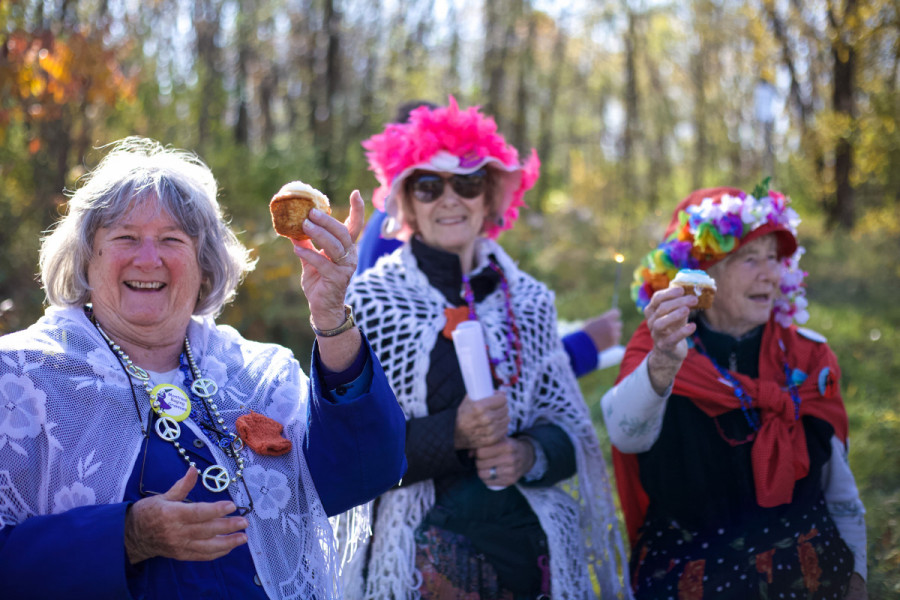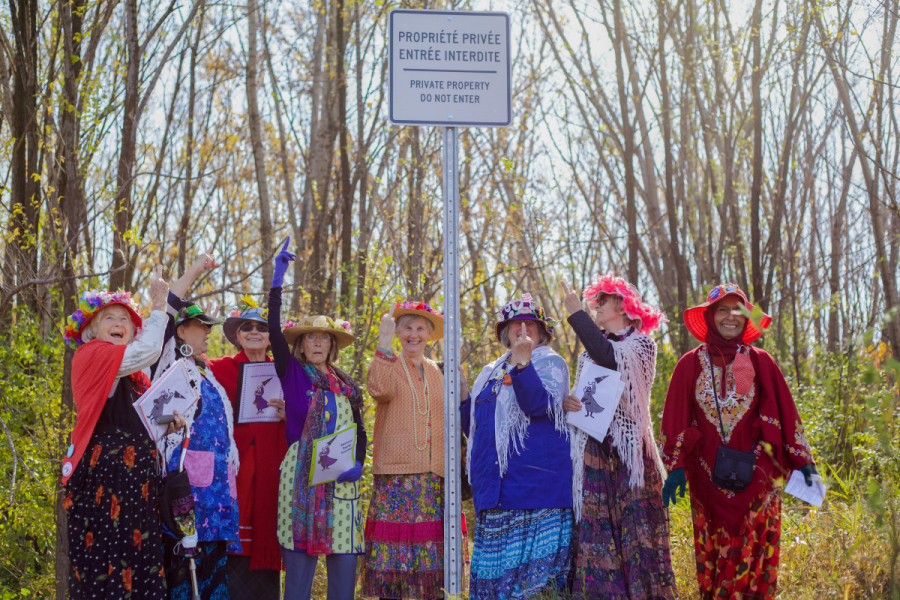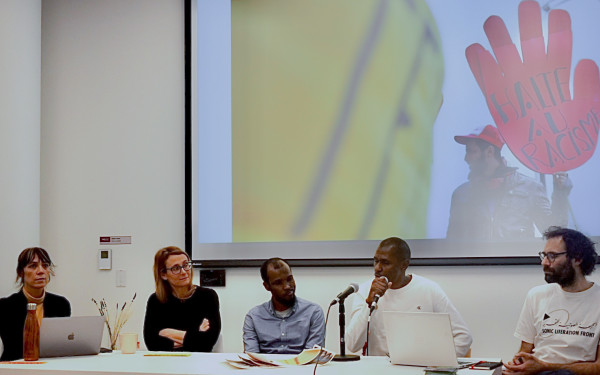Three Decades of the Raging Grannies: Singing, Blockading, Protesting
The Montreal Activists Say Their Work Is More Relevant Than Ever
Holding a stack of bright yellow flyers in one hand and a cane in the other, Maureen Adelman stopped students at the entrance of Concordia's Hall building to ask about their plans on voting day.
She was wearing a red felt hat with faux flowers along its rims, a matching red shawl, and a string of bright blue beads etched with peace signs.
Adelman, 88, was standing outside of her alma mater with five other members of the activist group Montreal Raging Grannies just a week away from the 2022 Quebec election.
“If you can’t be bothered voting, do not bitch!” they sang, with their quilted skirts, floral embroidered floppy hats and guitars in tow. The line stopped students in their tracks.
Some took a photo or video, and others nodded with their thumbs up as they passed by. The Grannies were familiar with this routine, and they expected it would be effective in encouraging the youth vote.
But elections aren’t the only thing the Grannies rage about.
For more than three decades, the Montreal Raging Grannies have been a fixture among the city’s activists, taking part in government hearings, marching in protests, blocking entrances to corporate banks—all while singing against what they consider conservative policies.
The gaggle of Grannies, as they refer to themselves, say their work is more relevant than ever, that their fight against pipelines, wars, racism and a long list of other issues, is one for future generations.
The Montreal gaggle is a chapter of the Raging Grannies, an international non-profit originally founded in 1987 in Victoria, B.C. One of its first demonstrations was aboard the Rainbow Warrior, a nuclear-powered United States Navy warship docked in Victoria Harbour.
Together with campaigning organization Greenpeace, the original gaggle of Grannies protested what they saw as potential health and environmental threats to the city. That year, they took their self-described “granny-style” outfits and provocative song lyrics to protest the Canadian government’s nuclear inaction and hearings on uranium mining.
“You have to be a bit bold, a bit bizarre and a bit in-your-face.” — Sheila Laursen
The media attention they gained from their first protests spread word of the organization, and chapters began to sprout in cities across Canada and the United States. Today, gaggles of Grannies can be found in eight countries around the world.
Montreal’s chapter was formed in 1989, and was headed by four women who were members of a peace group called “West Islanders for Nuclear Disarmament.” Founders Joan Hadrill, Mary Rowan, Barbara Seifred and Jean Laidlaw Perreault gave way to over thirty-four years of Grannies who rage.
The chapter’s first protest was against Canada’s involvement in the 1990-1991 Gulf War. Outfitted with their flashiest granny garb, they marched to the army recruitment office in downtown Montreal.
“The Grannies said, ‘take us instead of our grandchildren,’” said 76-year-old Sheila Laursen, a granny who’s been raging since 2010. “Of course, the officers didn’t know what to do with the Grannies.”
Today, the Grannies are more concerned than ever about the climate crisis, and find themselves fighting alongside teenagers and young activists across the city.
In 2021, they picketed the headquarters of the Royal Bank of Canada in solidarity with Wet’suwet’en water protectors, calling for an end to its investment in the Coastal Gaslink pipeline.
Later that year, they joined students of Divest McGill in calling for the university to end its investment in fossil fuels and sever its ties with RBC. They raged alongside young protesters when climate activist Greta Thunberg led 500,000 people in Montreal’s first Fridays for Future march, and have since participated in every annual youth-led climate strike.

They say their activism is distinctly aligned with younger activists both in the causes they fight for and the way they draw attention to the issues they’re concerned about. Ultimately, they believe their goal is to serve the generations to come.
On their website, there is nearly no requirement to become a part of the gaggle. “Despite our name, you do not have to be a biological grandmother to be a Raging Granny,” it reads. “We sing out of a deep commitment to justice, peace and equal treatment for all.”
Long before Laursen retired as a director of the YMCA of Montreal, she knew she wanted to join the gaggle. She said that she’d been a “Raging Granny Wannabe” ever since she presented the group with the YMCA Peace Medal in 2001.
“I remember phoning [Hadrill] and saying, ‘Guess what? I’m retired, and this is the first thing on my what-I’m-going-to-do-when-I-retire list,” Laursen recounted. “‘But I don’t sing that well,’ I said. She told me that it’s nothing you audition for, it’s something you do because you’re passionate about it.”
According to Laursen, the only real requirement to join the gagglers is conviction. “You have to be a bit bold, a bit bizarre and a bit in-your-face,” she said.
Being in-your-face is the goal of every routine. When the Grannies gather for upcoming demonstrations, they debate over the most provocative lyrics and catchiest tunes. They say that through the lyrics, they find humour and a healthy way to rage.
“The songs help us rage from our hearts,” Adelman said. “We also want to be a real nuisance to misguided politicians. We really just want to educate the public and get them to speak up for themselves, but we also like to humour and make people laugh.”
Humour was what led the Grannies to create a limited-edition nude calendar titled Old, Bold & Beautiful in 2013. Laursen is pictured on its cover standing against a pink backdrop with ten other women, each of whom posing nude with just a floral floppy hat.
“We couldn’t do this without the Grannies. They are one of the reasons we’ve been able to fight for this long.” — Genevieve Lussier
“The Montreal Raging Grannies expose the ‘bare facts’ about peace, social justice and respect for the earth—” the cover read, “issues that cause these Grannies to rage!”
Laursen says the idea came while she and fellow Grannies were brainstorming ways to raise funds for post-production on a documentary about the Raging Grannies.
The Montreal Grannies had been presented with eight years of footage of Grannies across Canada by filmmakers Magnus Isacsson and Martin Duckworth, but needed $40,000 to put it together. The Grannies didn’t think they’d ever raise enough money from bake sales alone, so they took inspiration from the 2003 British film, Calendar Girls.
“We thought, how many copies should we make, because who’s going to buy this?” Laursen said. “I decided our kids would probably buy at least a few to keep them off the market, so I think we ordered 500. Well, we sold out and had to go into a second printing.”
Sales from the calendar raised $20,000 towards the documentary, which debuted in 2014.
The gaggle took the project as an opportunity to raise awareness towards local community initiatives. Each month featured a verse from one of their songs, and included a QR code that would take readers to a group that was working towards solutions on issues including housing, food or climate justice.
Years later, the Grannies still get calls on whether another issue is in the plans.
“We had a riot doing it. It was crazy, creative and fun, but we’d say that it was a once in a lifetime issue,” Laursen said. “We got our message across in a pretty different way.”
Adelman and Laursen both say that along with the fun, the Grannies also serve as peacekeepers, and that their presence was meant to de-escalate any confrontations between civilians and authorities. After all, Laursen said, police would likely think twice before “rough housing” with a bunch of elderly women wearing feather boas and bright hats, regardless of how provocative their songs might be.

“When you see someone with a silly hat or a colourful shawl, it really does diffuse a situation that could be potentially ugly,” Adelman said. And given the Grannies’ track record, they’ve worked their positionality to their advantage.
“We’re a bunch of old ladies, but we stand our ground,” Laursen said. “Sometimes we sit our ground,and you know, there’ve been Grannies who’ve laid on the ground, and said, ‘No, I don’t want you to do this and this is how I’m protesting and I’m doing it peacefully’.”
For local activists, the Grannies remain a pillar in the city’s fight for environmental and climate justice. Save Fairview Forest, an organization that has been picketing the commercial development of a 45-acre plot of private woodland in the West Island of Montreal, says the Grannies are both icons and allies in their cause.
“We couldn’t do this without the Grannies,” said Genevieve Lussier, organizer of Save Fairview Forest. “They are one of the reasons we’ve been able to fight for this long.”
Lussier and other residents of the West Island invited the Grannies for their 100th consecutive week of protests, where activists have been standing on the corner of Fairview Ave. and Brunswick Blvd. every Saturday for nearly two years. Drivers honked in support as they drove by, and young protesters cheered as the gaggle launched into song.
“Hey you!” Adelman said, waving her cane at the sedan that was stopped at the intersection. “We need to save Fairview Forest!”
At an organizing meeting the following Monday, the gaggle gushed about the event at the forest. They chatted over each other excitedly, sharing details of what they considered a successful demonstration with another group of activists.
One granny mentioned that they had been interviewed by West Island Home and Life, a local online magazine. Another granny added that the mayor was there. Another added that there were several teenagers and young people who cheered when they walked up to the sign posted at the entrance of the forest that read, “Private Property: Do Not Enter.”
“I guess they didn’t want any trespassers. But it didn’t matter,” said Helen Van Veeren, a member of the gaggle. “Our idea was to trespass, so we stood under the sign and gave it the finger.”

For most of the meeting, the gaggle spoke about the event and its success, touching on the attention they drew to Save Fairview Forest’s fight. The forest has been placed on a temporary development freeze, but a long-term solution would require intervention from the federal Minister of Environment and Climate Change.
The group made a pledge to write letters to the minister then moved along the list of other issues they were angry about, and the other causes they were championing. They agreed that the gesture outside of the forest was appropriate for the cause, and that the defiance they share with young activists today is more relevant than ever.
If there were any expectations of what a granny should be, the gaggle was sure to subvert them or work them towards expressing the rage that kept them going.
“Good on us, good for the Grannies,” Adelman said, turning to Laursen. “We’re supposed to be outrageous, and that’s what we did.”
This article originally appeared in Volume 43, Issue 12, published February 21, 2023.




_(1)_600_375_s_c1.png)
__600_375_s_c1.png)

